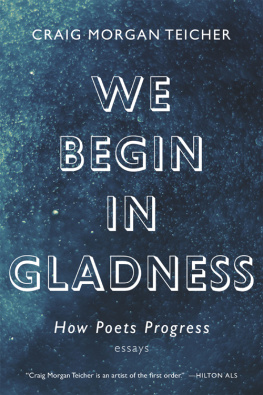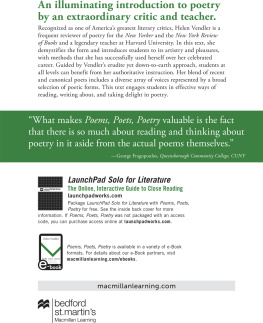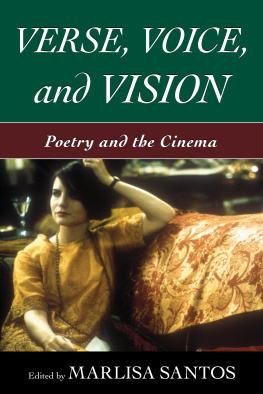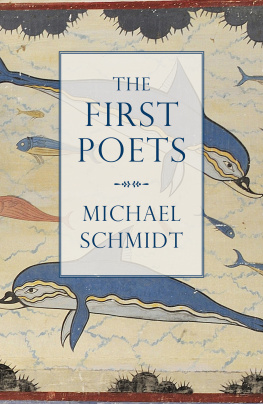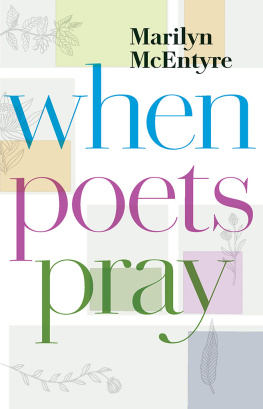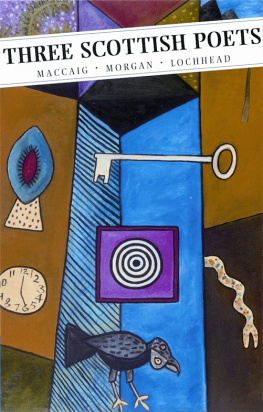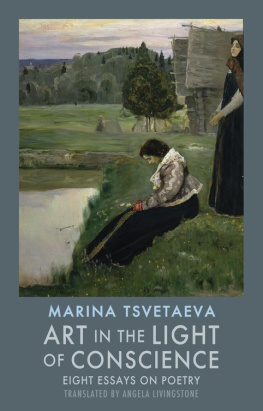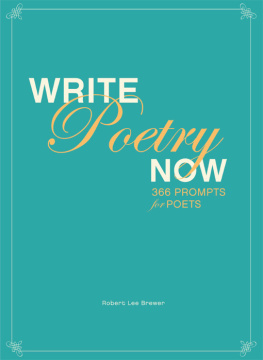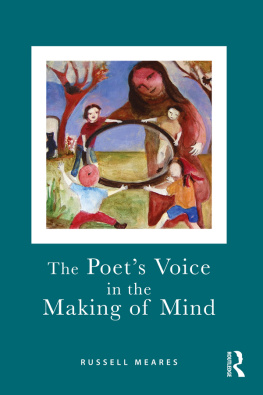We Begin in Gladness

Also by Craig Morgan Teicher
Poetry
The Trembling Answers
Ambivalence and Other Conundrums
To Keep Love Blurry
Brenda Is in the Room and Other Poems
Fiction
Cradle Book
As Editor
Once and for All: The Best of Delmore Schwartz
CRAIG MORGAN TEICHER
WE
BEGIN
IN
GLADNESS
How Poets Progress
Essays
Graywolf Press
Copyright 2018 by Craig Morgan Teicher
The author and Graywolf Press have provided this e-book to you for your personal use only. You may not make this e-book publicly available in any way. Copyright infringement is against the law. If you believe the copy of this e-book you are reading infringes on the authors copyright, please notify Graywolf Press at: us.macmillanusa.com/piracy.
This publication is made possible, in part, by the voters of Minnesota through a Minnesota State Arts Board Operating Support grant, thanks to a legislative appropriation from the arts and cultural heritage fund, and a grant from the Wells Fargo Foundation. Significant support has also been provided by Target, the McKnight Foundation, the Lannan Foundation, the Amazon Literary Partnership, and other generous contributions from foundations, corporations, and individuals. To these organizations and individuals we offer our heartfelt thanks.

Published by Graywolf Press
250 Third Avenue North, Suite 600
Minneapolis, Minnesota 55401
All rights reserved.
www.graywolfpress.org
Published in the United States of America
ISBN 978-1-55597-821-1
Ebook ISBN 978-1-55597-872-3
2 4 6 8 9 7 5 3 1
First Graywolf Printing, 2018
Library of Congress Control Number: 2018934489
Cover design: Kapo Ng
Cover art: Shutterstock
For Robert Farnsworth and Kathleen Reilly, my two great teachers:
Nor is there singing school but studying
Monuments of its own magnificence
W. B. Yeats
In a dark time, the eye begins to see
Theodore Roethke
Even if you are on the first step, you ought
to be dignified and happy.
To have got this far is no small thing;
what you have done is a glorious honor.
Even that first step, even the first,
is very far removed from the common lot.
In order for you to proceed upon this stair
you must claim your right to be
a citizen of the city of ideas.
Constantine Cavafy, The First Step
We Begin in Gladness
Introduction: We Begin in Anticipation
I thought of Chatterton, the marvellous Boy,
The sleepless Soul that perished in his pride;
Of Him who walked in glory and in joy
Following his plough, along the mountain-side:
By our own spirits are we deified:
We Poets in our youth begin in gladness;
But thereof come in the end despondency and madness.
These famous lines come from William Wordsworths long, essayistic poem Resolution and Independence. Robert Lowell revisits the lines in his poem To Delmore Schwartz, from Life Studies, in which he ascribes to Schwartz a chilling play on Wordsworths closing couplet:
You said:
We poets in our youth begin in sadness;
thereof in the end come despondency and madness;
Both versions point to an old, sad stereotype about poets: that, perhaps, writing poems and looking too long at the trials of the human mind and heart in a troubled world beckon poets to their undoing. Lowell and Schwartz were thinking particularly of their own imperiled peersSylvia Plath, Randall Jarrell, and John Berryman most famouslywho met terrible ends in the throes of mental ill health. Poetry couldnt save them, Schwartz seems to say.
But many poetsWordsworth was among themlive and write into ripe old age and have the chance to author what can be a remarkable literary product, late work, the result of a lifetimes artistic development. Of the prose writer Primo Levi, whose suspected suicide was a frightening and disheartening cap to his lifes work, the critic Joan Acocella writes, It is a species of sentimentality to think that the end of something tells the truth about it. She means that artists lives do not necessarily parallel their art, or even indirectly cause itWallace Stevens, for example, wrote little poetry about his day job as an insurance executive. Its a misapprehension to read by their deathsor even by their lives, in many cases. To read them, however, by their journeys, by how their art grew and changed over the course of their writing lives, tells us a great deal about what they made and why.
Poetry is a conversation, an extended one, occupying, perhaps, the span of an entire life. Poets converse, first and foremost, with their languageEnglish for our purposesand with the idea of language itself. Poets are word fetishists, among other things, and their grounding belief is that language is humankinds greatest technology, inexhaustible, endlessly adaptable, a mirror of a poets own time and, hopefully, of the endless unfolding of all time. A poet casts words into the ether to hear what words come back. It can seem like a lopsided dialogue, only part of the conversation. But most poets will tell you thats not the case: poets speak inwardly, talking into their minds and listening for their minds responses. Each word is followed by another, each sentence answered by a sentence; each stanza opens into the next, and, when poems are working, they are full of discoveries, thoughts poets didnt know they had, thoughts, perhaps, they hadnt had until that moment, which are encoded in the language itself, which poets have trained themselves to hear.
The language, in the way Im referring to it, is made up of many thingsall the speech and text poets have heard throughout their lives: conversations, schooling, the poetry of the present and the past, and all the elements of culturemusic, sports, film, TV, digital media, artthat have helped form an individuals personality. Together, these elements create a matrix of connections, which poems can reveal. This is in part what defines a poets voice. Using the particulars of the language that formed them, poets hope to tell the truth about their time as exemplified in themselves, in what they see and, more precisely, hear. Whether or not she writes about her own biography, she is the mouth through which her time is sungthey are her, his words, after all. Poetry makes its case through each poets sensibilities; it is never impersonal.
Though it seems, at first, like an art of speaking, poetry is an art of listening. The poet trains to hear clearly and, as much as possible, without interruption, the voice of the mind, the voice that gathers, packs with meaning, and unpacks the language the poet knows. It can take a long time to learn to let this voice speak without getting in its way. This slow learning, the growth of this habit of inner attentiveness, is poetic development, and it is the substance of the poets art. Of course, this growth is rarely steady, never linear, and is sometimes not actually growth but diminishmentthats all part of the compelling story of a poets way forward.
A poet speaks to him or herself by writing down a line and then converses by listening, by transcribingwith some editingwhat comes back. For this conversation to be meaningful and engagingto others, of course, but most importantly, in the act of composition at least, to the selfit must unfold and change: thoughts must lead to other thoughts. Why would anyone stay in a conversation that never goes anywhere? Good talk is full of surprises, of questions that lead to revelations that prompt further questions. Think of all the great poems that open up this way, as when Emily Dickinson famously plays a game of call-and-response with her mind:

